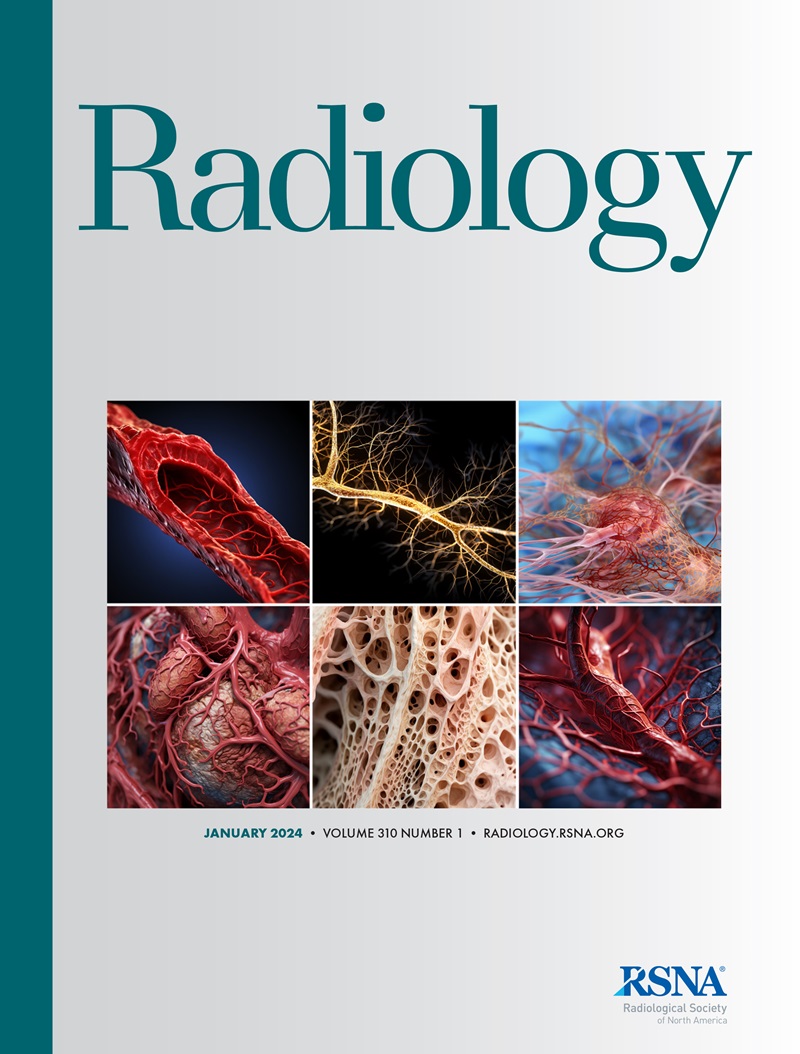Detecting Cellular Microstructural Changes of Liver Fibrosis with Time-Dependent Diffusion MRI.
Lijie Zhang, Xi Long, Leqing Chen, Xiaoyu Han, Xiaoxiao Zhang, Peng Sun, Yuhan Yang, Jun Fan, Jiazheng Wang, Ziqiao Lei, Bin Liang, Xiaoming Liu, Heshui Shi
求助PDF
{"title":"Detecting Cellular Microstructural Changes of Liver Fibrosis with Time-Dependent Diffusion MRI.","authors":"Lijie Zhang, Xi Long, Leqing Chen, Xiaoyu Han, Xiaoxiao Zhang, Peng Sun, Yuhan Yang, Jun Fan, Jiazheng Wang, Ziqiao Lei, Bin Liang, Xiaoming Liu, Heshui Shi","doi":"10.1148/radiol.240343","DOIUrl":null,"url":null,"abstract":"<p><p>Background The potential of time-dependent diffusion MRI in imaging the progression from liver fibrosis to cirrhosis has not been established. Purpose To assess the effectiveness of time-dependent diffusion MRI in mapping the microstructure and characterizing cellular attributes during the progression of liver fibrosis to cirrhosis and to investigate its potential in grading liver fibrosis. Materials and Methods This prospective study, performed between December 2022 and October 2023, used 60 rats to establish a liver fibrosis model by means of diethylnitrosamine administration, with five additional rats serving as control animals. Time-dependent diffusion MRI was performed with equivalent diffusion time of 5.4, 10.7, and 69.3 msec on a 3.0-T scanner. Time-dependent diffusion MRI-based microstructural parameters, including cell diameter, intracellular volume fraction (ICVF), cellularity, and extracellular diffusivity, were estimated with use of the imaging microstructural parameters using limited spectrally edited diffusion, or IMPULSED, model. The fitted microstructural parameters were validated with histopathologic measurements. Results All 60 rats developed liver fibrosis, with a noticeable decrease in cell diameter and an increase in ICVF and cellularity observed as liver fibrosis progressed. The diameter measured at pathologic examination ranged from 11.4 μm to 35.4 μm, aligning with the range of 12.4-33.4 μm observed in time-dependent diffusion MRI, which indicated a strong correlation (<i>r</i> = 0.84; <i>P</i> < .001). The quantified ICVF at pathologic examination ranged from 0.28 to 0.89 and varied from 0.23 to 0.85 at time-dependent diffusion MRI, showing a high correlation (<i>r</i> = 0.62; <i>P</i> < .001). The cellularity observed at pathologic examination increased from 0.74 to 5.85, while the cellularity measured at time-dependent diffusion MRI ranged from 0.77 to 3.70, showing a correlation (<i>r</i> = 0.44; <i>P</i> < .001). Conclusion This study revealed the changes in quantitative microstructural mapping across the spectrum from liver fibrosis to cirrhosis. Cell diameter, ICVF, and cellularity are reliable markers for liver fibrosis, with diameter and ICVF presenting good discrimination ability. © RSNA, 2024 <i>Supplemental material is available for this article.</i> See also the editorial by Matos and Metens in this issue.</p>","PeriodicalId":20896,"journal":{"name":"Radiology","volume":"313 1","pages":"e240343"},"PeriodicalIF":12.1000,"publicationDate":"2024-10-01","publicationTypes":"Journal Article","fieldsOfStudy":null,"isOpenAccess":false,"openAccessPdf":"","citationCount":"0","resultStr":null,"platform":"Semanticscholar","paperid":null,"PeriodicalName":"Radiology","FirstCategoryId":"3","ListUrlMain":"https://doi.org/10.1148/radiol.240343","RegionNum":1,"RegionCategory":"医学","ArticlePicture":[],"TitleCN":null,"AbstractTextCN":null,"PMCID":null,"EPubDate":"","PubModel":"","JCR":"Q1","JCRName":"RADIOLOGY, NUCLEAR MEDICINE & MEDICAL IMAGING","Score":null,"Total":0}
引用次数: 0
引用
批量引用
Abstract
Background The potential of time-dependent diffusion MRI in imaging the progression from liver fibrosis to cirrhosis has not been established. Purpose To assess the effectiveness of time-dependent diffusion MRI in mapping the microstructure and characterizing cellular attributes during the progression of liver fibrosis to cirrhosis and to investigate its potential in grading liver fibrosis. Materials and Methods This prospective study, performed between December 2022 and October 2023, used 60 rats to establish a liver fibrosis model by means of diethylnitrosamine administration, with five additional rats serving as control animals. Time-dependent diffusion MRI was performed with equivalent diffusion time of 5.4, 10.7, and 69.3 msec on a 3.0-T scanner. Time-dependent diffusion MRI-based microstructural parameters, including cell diameter, intracellular volume fraction (ICVF), cellularity, and extracellular diffusivity, were estimated with use of the imaging microstructural parameters using limited spectrally edited diffusion, or IMPULSED, model. The fitted microstructural parameters were validated with histopathologic measurements. Results All 60 rats developed liver fibrosis, with a noticeable decrease in cell diameter and an increase in ICVF and cellularity observed as liver fibrosis progressed. The diameter measured at pathologic examination ranged from 11.4 μm to 35.4 μm, aligning with the range of 12.4-33.4 μm observed in time-dependent diffusion MRI, which indicated a strong correlation (r = 0.84; P < .001). The quantified ICVF at pathologic examination ranged from 0.28 to 0.89 and varied from 0.23 to 0.85 at time-dependent diffusion MRI, showing a high correlation (r = 0.62; P < .001). The cellularity observed at pathologic examination increased from 0.74 to 5.85, while the cellularity measured at time-dependent diffusion MRI ranged from 0.77 to 3.70, showing a correlation (r = 0.44; P < .001). Conclusion This study revealed the changes in quantitative microstructural mapping across the spectrum from liver fibrosis to cirrhosis. Cell diameter, ICVF, and cellularity are reliable markers for liver fibrosis, with diameter and ICVF presenting good discrimination ability. © RSNA, 2024 Supplemental material is available for this article. See also the editorial by Matos and Metens in this issue.


